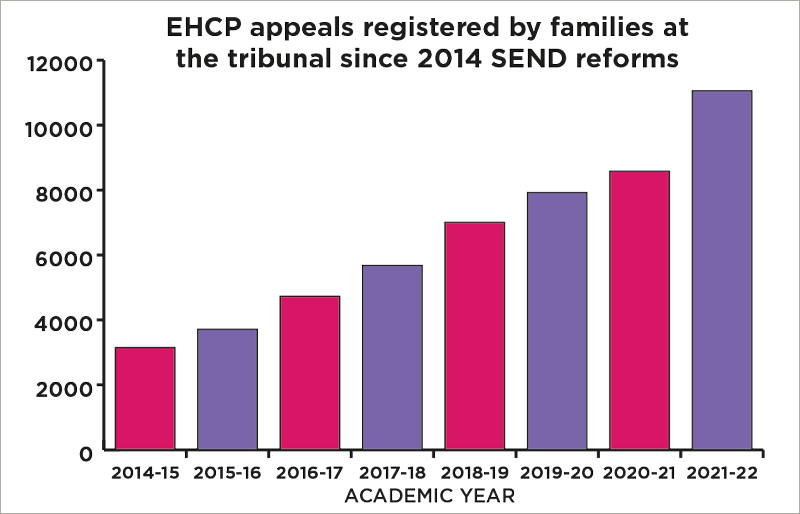The number of parents launching tribunal appeals over a council’s refusal to provide SEND support for their vulnerable child has passed 10,000 in a year for the first time.
In the past academic year, 11,052 SEND appeals were registered – a 29 per cent rise from 8,579 the previous year.
This is more than triple the number of appeals when landmark special educational needs and disability reforms were introduced in 2014. It’s also the largest annual hike in appeals.
Parents can appeal against council refusals to assess a child’s needs or to issue an education, health and care plans (EHCP).
Of the 5,600 that went to a hearing, 5,393 (96 per cent) tribunals sided with families either in whole or in part.
Professor Brian Lamb, whose 2009 review influenced reforms, said: “These figures show that the current system is failing too many children and families.”

Schools Week previously revealed parents had used their life insurances and spent tens of thousands to challenge their local authorities in court.
The number of children and young people with EHCPs is now at 473,330 after a 10 per cent increase in a year.
Ministry of Justice (MoJ) data shows 27 per cent of appeals were against a council’s refusal to secure an assessment for a plan, while 54 per cent were against the council’s choice of a school or college.
Half of appeals were for children with autism
Half of registered appeals were for children with autism and 15 per cent were related to social, emotional and mental health needs.
Another 13 per cent were related to a moderate learning difficulty – a near tripling from the previous year.
Matt Keer, a SEND researcher, said it showed the “enormous human and financial cost to families.
“What families are ‘winning’ here is the same right to an appropriate education that families of children without SEND take for granted. There are no magic prizes, no golden tickets, no stairways to heaven here.”
The government’s SEND green paper plans to introduce mandatory mediation on EHCP disputes, but experts say this could further slow the system.
Currently, families only need a mediation certificate to register, but do not have to go through the mediation itself.
The SEND implementation plan has been delayed until early next year.
A Local Government Association spokesperson said the figures were “indicative of a system that is not working. Councils do everything they can… within the budgets made available by the government.”
A government said it had recruited an additional 50 judges this year to deal with “rising demand”, with another 30 being hired next year.
A spokesperson said they are “prioritising appeals involving school transfers and expediting cases if both sides agree to earlier hearings.
“Local authorities have a responsibility to ensure that there is appropriate education for all children in their local area. We encourage local authorities and providers to work collaboratively so the right range of provision is available to all children.”
















Your thoughts